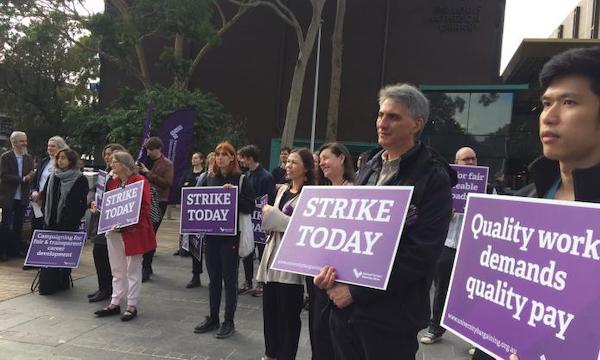The government, university bosses and national officials of the National Tertiary Education Union are combining to attack uni workers’ pay and conditions.
Australian universities’ revenues are falling as international student enrolments decline in the COVID-19 crisis. After decades in which the sector was reshaped to depend on international student enrolments for profits, university managers are forecasting losses in the hundreds of millions of dollars. They’re crying poor and pushing harsh cutbacks.
The University of New South Wales is one of the richest universities in Australia. But it claims to be facing a budget shortfall of $600 million this year. Other universities such as Victoria University say that they are at risk of folding.
University managers everywhere are taking advantage of the situation to cut budgets hard. They’re stopping or pausing recruitment, ending contracts that would have otherwise been extended, sacking thousands of casual staff or significantly reducing the number of hours previously promised to casuals.
All this when workloads have increased in the rush to shift courses online.
Department budgets have been cut. Most universities have imposed a ban on all travel, conferences and capital expenditure. The teachers who remain have been scrambling to shift courses online and to create and maintain virtual classrooms. Materials, curricula and examinations must be re-written to suit the online environment. Then there is the time required to learn new technologies and systems.
But the university bosses warn us that these measures will not be enough.
Shamefully the top officials of the National Tertiary Education want to help them cut back. They have responded to management’s demands for concessions, “in order to save jobs” by surrendering, without a fight. In an email to members on 8 April, the general secretary wrote:
To protect jobs, we may need to consider measures that we would never normally consider. These may include deferral of pay rises, providing the ability to direct taking of leave, or other cost saving measures. Any changes must be temporary and proportional to the loss at each university.
Deferring pay rises that are in enterprise agreements means cuts in real wages. Giving bosses the right to direct taking leave means we can’t decide on how we use our own leave entitlements. “Other cost saving measures” lets bosses do whatever they like, including sacking people.
The excuse for selling out pay and conditions is that the officials’ “primary aim is to protect jobs and to ensure that job cuts are the last resort”. This concedes job losses.
And concessions now open the way to the 20 percent wage cut uni managements clearly want.
Giving away pay and conditions is not the way to save jobs. Remember that in 2013, workers at Holden were pressured to accept cuts in real wages and in conditions, including shift times, shorter breaks and harsher discipline. Four months later, the company announced that it would be shutting down entirely in a few years.
In the Great Depression, the Scullin government cut public sector salaries and other government payments by 20%, and the arbitration court cut all other wages by 10%. This did not save a third of the workforce from unemployment.
We must demand that there are no job losses, that universities continue to employ all staff, including casuals who were lined up to work this semester but were not hired. The NTEU leadership is calling on us to accept losses “proportional to the loss at each university”. We can’t let ourselves be divided and conquered like that.
In fact, we’ve already conceded too much. Over the last decade and more, university workers have endured increased workloads, overwork, wage theft, unpaid overtime, massive casualisation and more dictatorial control by management.
What we lose now will be much more difficult to win back later. Bosses will not be keen to let us have our old conditions back.
The threat of a university collapse is being used to scaremonger and force concessions from the workforce. It should be rejected. Instead, we should demand that the government immediately boost university funding to make up for the loss of market revenue, that university bosses draw on their reserves and access their lines of credit and go into debt instead of cutting budgets, and that both guarantee that there will be no job losses.
Universities should also reinstate all workers–fixed-term, casual or continuing–who have already lost their job in the current crisis. This response would protect workers’ rights and conditions, and the provision of education, instead of profits.
Union leaders representing workers in sectors like clerical and hospitality have negotiated award changes, allowing bosses to cut workers’ hours (and therefore pay). In exchange they’ve got only promises of job security, which are unenforceable. The same is true of the deal proposed by the NTEU officials.
To really protect job security in universities, we need:
- Government funding and use of universities’ reserves and credit facilities to sustain jobs, and the quality of education, with no strings attached.
- Full transparency about negotiations between NTEU officials, bosses and the government.
- Mass online meetings, with scope for debate, to assess the progress of negotiations and to vote on any proposed national agreement.
- A national campaign, including the possibility of industrial action around our demands on government and university managements.

